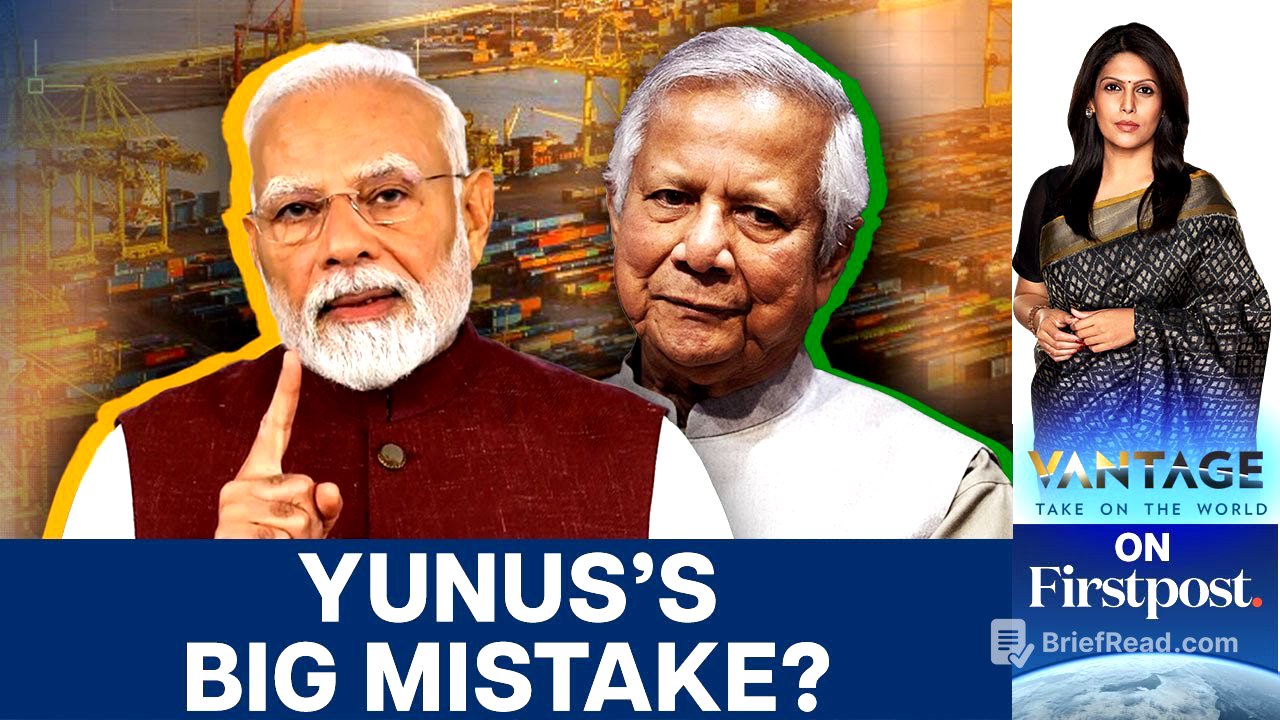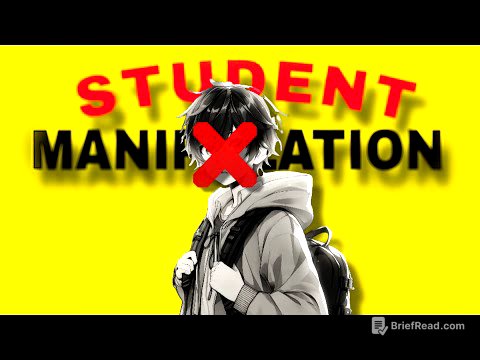TLDR;
This video discusses the recent trade restrictions imposed by India on Bangladesh in response to Dhaka's growing ties with China and controversial statements made by Bangladesh's interim ruler, Muhammad Ununus. India's actions, including closing key border checkpoints, are a reaction to Ununus's invitation to China to access Indian territory through Bangladesh and increasing Chinese investments in Bangladesh. The restrictions target various Bangladeshi exports, potentially impacting the country's economy, which is already under strain. The video also touches upon Firstpost's commitment to accuracy and transparency in their reporting.
- India has imposed trade restrictions on Bangladesh, targeting key exports and closing border checkpoints.
- This action is a response to Bangladesh's growing ties with China and controversial statements made by Muhammad Ununus.
- The trade restrictions could significantly impact Bangladesh's economy.
- Firstpost reaffirms its commitment to accuracy and transparency in news reporting.
India-Bangladesh Trade Tensions [0:04]
India is feeling the heat from New Delhi as India has imposed new trade restrictions on Dhaka, targeting a range of imports from Bangladesh, including garments, which is the country's biggest export. Four key border checkpoints in northeast India have been closed to Dhaka because Dhaka has been doing the same to some Indian goods. Also, the interim ruler Muhammad Ununus's growing ties with China have not helped. He recently called northeastern India landlocked and invited China to access Indian territory through Bangladesh. This statement, along with a string of Chinese investments, has raised alarms in Delhi, and now India is sending a clear message that trade ties come with boundaries, and Dhaka may have just crossed one.
Ununus's Statement and China's Involvement [1:00]
Muhammad Ununus is facing consequences for his statements, particularly one made during his visit to China in March. He suggested that China could use Bangladesh as a gateway to access India's northeast, which comprises seven landlocked states, also known as "seven sisters". This proposal for China to extend its economic influence into the region didn't go unnoticed in New Delhi.
India's Retaliatory Measures [1:47]
In response to Ununus's statements and actions, the Indian government announced a series of trade restrictions impacting Bangladeshi exports. These exports, including readymade garments, plastic items, wooden furniture, carbonated drinks, bakery, confectionary, cotton yarn, and dyes, will now face curbs and lose access to four key land routes in Tripura, Assam, Meghalaya, and Mizoram, all located in India's northeast. New Delhi is matching Bangladesh's measures by restricting several imports from Bangladesh to seaport entry only, mirroring Dhaka's earlier restrictions on Indian yarn shipments.
Economic Impact and Geopolitical Concerns [3:16]
These trade curbs can hurt the economy of Bangladesh, which is already under strain and needs more foreign exchange. India's restrictions could impact $770 million worth of exports, nearly 42% of Bangladesh's shipments by land to India. India has legitimate reasons to be concerned as, under Ununus, China has made deeper inroads in Bangladesh. During a visit to Beijing, multiple deals were signed, including new Chinese investments, a Chinese economic zone in Chittagong, and the modernization of the Mongla port. China is also showing new interest in the Thista River project, where New Delhi was earlier assured exclusivity. Ununus also secured around $2 billion in loans, grants, and investments from China, signaling a clear message to New Delhi that Ununus is pitting China against India.
Dialogue and India's Red Line [4:32]
Bangladesh now wants to have a dialogue with India to resolve trade issues, but the tone from New Delhi has shifted. This is no longer just about trucks or tariffs; India is drawing a red line, stating that trade and provocations cannot go together. While Ununus may call northeastern India landlocked, New Delhi has now locked him out.
Firstpost's Commitment to Accuracy [5:04]
Firstpost reaffirms its commitment to accuracy, prioritizing verified and cross-checked information over being the first to break news. They acknowledge a recent error involving a fake visual from a registered news agency and commit to citing the source of every visual from now on, emphasizing their dedication to providing facts without noise or panic.









